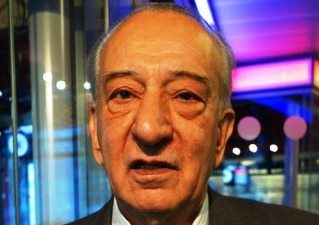 Akbar Etemad, the architect of Iran's nuclear programme, refused a request to work for Saddam Hussein[/caption]
Akbar Etemad, the architect of Iran's nuclear programme, refused a request to work for Saddam Hussein[/caption]In a rare interview, the man dubbed "the father of Iran's nuclear programme" tells how the project began under the Shah, who wanted to leave the option for a bomb open.
Now in his 80s, Akbar Etemad remembers all too clearly the pressure the Americans tried to apply to him when he was head of Iran's nuclear programme between 1974 and 1978.
Mr Etemad was the president of Iran's Atomic Energy Organisation and it was under him that the country's nuclear project began and flourished.
The Shah of Iran had announced that he wanted to build nuclear power plants in the country, a plan supported by the United States. The goal was for Iran to produce 23,000 megawatts of electrical power. But Mr Etemad says the US soon tried to impose conditions.
The Americans, he recalls, were initially supportive "because they thought they were going to be a partner of Iran in the application of nuclear technology.
"I had the impression that the Americans wanted to impose their views on Iran and I refused to deal with them. We were discussing for four years the terms of the bilateral agreement and we never came to a conclusion.''
He says that the Americans told him then that ''Iran is not a problem for us but the conditions we impose on Iran are those that we want to impose on other countries'' such as Yugoslavia and the Philippines.
Between 1974 and 1978 Mr Etemad says there was regular contact with the US, and Iranian students went to study nuclear research there.
And he reveals that the Shah wanted to leave all options on the table in terms of developing a nuclear bomb.
"The Shah had the idea at the time that he's strong enough in the region and he can defend our interests in the region [and] he didn't want nuclear weapons. But he told me that if this changes 'we have to go for nuclear'. He had that in mind.''
''My mission was to go for all the technologies imaginable in the field of nuclear technology,'' Mr Etemad explains.
'No way out'
After the 1979 Iranian revolution the nuclear programme was stopped for a time.
''At the beginning the revolutionaries thought that nuclear technology [was] one of the tactics of the US to put [a] hand on Iran. Later on they realised it was a successful programme and they had to continue it.''
Iran's new rulers asked Mr Etemad, who had left the country, to return but he refused. At the time he was not sure what they wanted to do. At first, he explains, Iran's supreme leader Ayatollah Khomeini was suspicious of everything but then accepted the nuclear programme.
Iran's nuclear programme stalled after the Shah was deposed in 1979
Mr Etemad has been back to Iran since but has not got involved in the nuclear programme. ''It's too late for me to get back into that,'' he says.
For years there have been rounds of talks trying to resolve Iran's nuclear question. Most recently negotiations have been held between Iran and the so-called P5+1 powers - the US, the UK, France, China, Russia and Germany.
These countries want Iran to grant the International Atomic Energy Agency (IAEA) far more access to its nuclear sites than it currently does and for Iran to answer questions and concerns the IAEA has about any possible military dimension to its nuclear programme
They are also calling for Iran to stop 20% uranium enrichment and to limit its enrichment to below 5%. The most recent round of talks ended without a resolution.
Commenting on the current deadlock, Mr Etemad says "there's no way out. I think Iran has the right to do the research that they are doing and I don't see why the Western countries impose sanctions against Iran.
"They pressure Iran. Why didn't they do it with India, Pakistan with Israel?" he asks. Mr Etemad currently sees no solution but thinks that ''Iran should not give in".
As for those who talk about striking Iran's nuclear facilities, he believes that "neither Israel or the US are in a position to attack Iran".
After the revolution, Mr Etemad established an office in Paris as a consultant in the field of nuclear energy. At the time the former Iraqi dictator, Saddam Hussein, whose country was at war with Iran, tried to persuade him to work in Iraq.
He refused to go, telling Saddam Hussein that ''as long as you are fighting my people I wouldn't come to Iraq. You are my enemy."
He says he refused offers from many countries to work on their nuclear programmes, preferring to remain in exile in Paris.
By BBC
The Iran Project is not responsible for the content of quoted articles.











